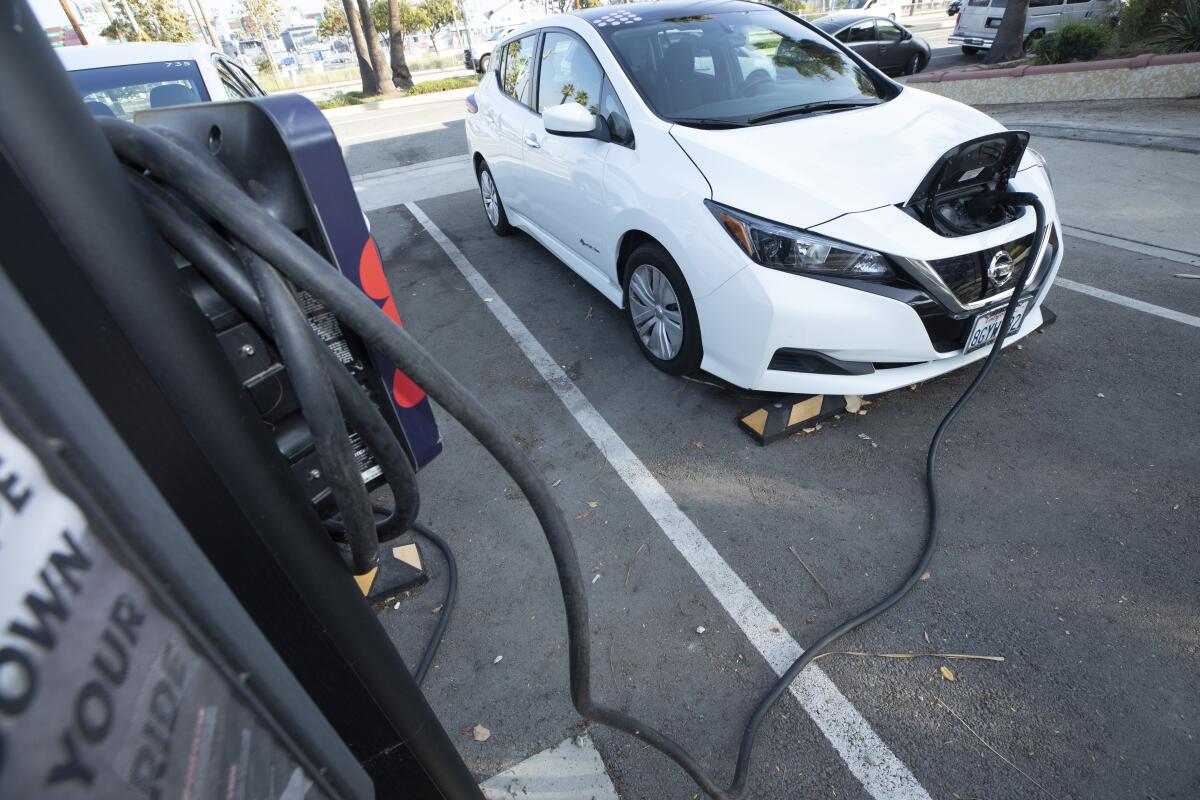Letters to the Editor: The Bolt is disappearing. Why we should welcome electric SUVs (for now)

- Share via
To the editor: Now is not the time for the government to micromanage automobile design. (“Replacing the Chevy Bolt with electric SUVs would be a climate tragedy,” editorial, May 4)
As an engineer who owns and has built electric vehicles, I completely agree that cars are too heavy. But I can assure you that car makers would really like to make them lighter, someday. They will get better, but the batteries are the problem. New batteries are on the way, but they take years of development.
Also, as usual with big engineering, it is not as simple as more weight means less efficiency.
My home-built Zenn weighed about 1,100 pounds, my Chevrolet Spark EV weighs 2,700, and a Tesla Model Y weighs 4,500. My Zenn used about 0.3 kilowatt-hour per mile, my Spark uses about 0.25, and the Model Y about 0.26. So, if government tried to mandate efficiency through weight, then heavy cars would be at the top.
Yes, the Hummer, Ford F-150 Lightning and Rivian are all heavy EVs that are less efficient. But switching from a gas truck to an EV truck saves a lot more greenhouse gas emissions than switching from a smaller car to a smaller EV.
What government needs to do is stay the course, promote EVs, restrict gas vehicles, and make it possible for car builders to turn their giant ships-of-industry around.
John Fisher, Santa Barbara
..
To the editor: As an EV owner for nearly 15 years, I feel profoundly disappointed by the loss of the Chevrolet Bolt. Broadly based EV options at a full range of prices have always been needed to spell the end of gas cars.
My volunteer work at the Tesla Irvine delivery center has put me face to face with the impact of lower cost, as Tesla has slashed prices.
The least expensive Model 3 is now less than $33,000 after the tax credit, and the type of customers shows how much more accessible this makes the car. There have been many more nurses than doctors, more teachers than executives, more street cops than captains, and more Corona than Corona del Mar.
There are better, less expensive choices coming. But as your editorial states, government tailoring incentives for lower-cost options would help a lot.
Fred Forster, Corona del Mar
..
To the editor: Where is today’s version of the Model T?
We want an electric car that’s more affordable than the behemoth SUVs coming off the line. I don’t understand why auto manufacturers push us into bigger and bigger vehicles, when many of us just need to get around town.
The Bolt could have been the answer, but perhaps General Motors was influenced by the electric Ford F-150 truck. I can’t be the only one who wants a modest EV that I can actually afford.
Maggie Wineburgh-Freed, Los Angeles
..
To the editor: The best way to ensure the continued production of the Bolt is to support $5 gasoline and, unfortunately, price gouging by oil companies.
The United States has some of the cheapest gas prices among the world’s high-income countries. Here, gas is less expensive than bottled water.
The quickest way to get people to buy EVs is by having hefty fuel prices. Since lawmakers lack the will to levy higher taxes on oil company profits or at the pump, we will have to live with outrageous fossil fuel profits if we want to speed the transition to EVs.
Fred Smoller, Orange
The writer is co-founder of the Orange County Sustainability Decathlon.





